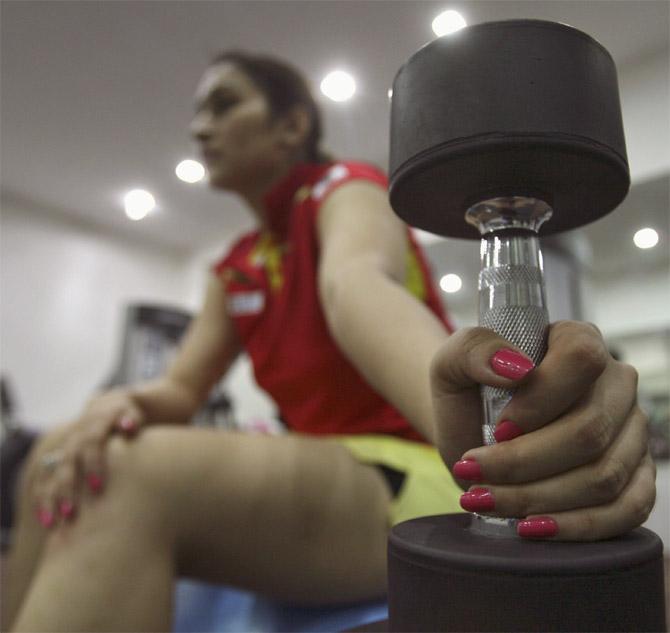 | « Back to article | Print this article |
Rujuta Diwekar: The weirdest excuses for NOT exercising!
As part of a special series, the celebrity dietician lists out simple things you can do to stay fit.
Rujuta Diwekar is best known for her two best-selling books -- Don't lose your mind lose your weight and Women and the weight loss tamasha -- as well as being the dietician who helped Kareena Kapoor get into the hot bikini for Tashan. (Purchase her books here)
In a two-part series, the celebrity dietician lists out the really weird excuses people use to not hit the gym as well as the basic dos and don'ts about eating.
Read the first article in this series here
We start with the most common (and weird) excuses for not exercising:
'I don't have the time'
This is a common excuse of a lot of young people. They have the time to be on Facebook, sit around and watch television but do not have the time to go for a walk or hit the gym. I believe that you are doing something drastically wrong with the way you are dealing with your time if you do not have the time for yourself.
All you need is 150 minutes a week to keep obesity at bay and keep yourself free of cardiovascular and other diseases.
'I pay the gym but never go. So why pay at all?'
That is a very incorrect attitude towards fitness. Gyms structure their fees in such a manner that you end up paying for the whole year. Many of us pay for the whole year but never end up going to the gym at all. Learn to value the commitment you have made to yourself and rather than saying: "I pay the gym but never go. So why pay at all?" commit yourself to going to the gym and making the most of the money you have spent.
'…But there is no parking at my gym!'
Trust me people have said that to me. Why take the car to the gym in the first place if you can walk? Or can you not park it say a hundred meters away and walk that distance?
Yes, these are all real excuses!
![]() Also read: REVEALED: How to eat AND stay fit!
Also read: REVEALED: How to eat AND stay fit!
Rujuta Diwekar is a celebrity dietician and the author of Don't lose your mind lose your weight and Women and the weight loss tamasha, both of which can be purchased on Rediff Books.
Rujuta Diwekar: How to eat right
Eating right isn't a task you can master and then fall back upon. Each meal is a challenge. Here are some tips to eat right.
The posture
One of the first places where we can start is the posture. There are studies that reveal that every time we sit cross-legged for a meal, the digestion, absorption, assimilation and excretion of the food we eat is much better than if your legs are dangling down. So if you see, in most eastern cultures, people sit cross-legged to heave their meals. Sitting this way may not be possible for all the meals in the day but perhaps you should try doing that for at least your breakfast and dinner -- meals that you have at home
No distraction
Today, most of our meals are had with the television playing before us. If it's not the TV, you have some distraction or the other in the form of phones, iPads etc that pull all the attention and your senses away from the meal. Entirely avoidable. Focus on eating when you're having a meal.
Say your food prayers
Every religion has a food prayer. If you don't believe in praying, observe a moment of silence before you start eating. The thing is we talk too much when we eat. We use meals to socialise, chatter away and mound our plates with food. There are times we don't even remember what we've eaten because we talk so much during our meals.
Be mindful of what you eat
This is again related to what I said earlier. We aren't aware of what and how much we eat. Before you start your meal, ask yourself how much food you want and serve yourself only half the quantity.
Once you're done with it, take two minutes and figure out if you really need more and go for the second helping only if you want to. Remember eating right is an art you can never master because each meal is a challenge, you can falter at each meal because you come to the table with different appetite and different moods.
There is a reason why eating the right amount is considered as the sign of wisdom.
Rujuta Diwekar: The most underrated foods in the Indian kitchen
Pickle
Pickle is very rich in the gut-friendly bacteria. The reason it is consumed in tiny portions is because for it to reach the gut alive and not be killed by the stomach acids, it has to be consumed with a big meal. So you have it with your chapattis or parathas or rice and never really by itself and most certainly not in large quantities.
Sugar
While the West was struggling to convert sugarcane into crystallised sugar, India had mastered the art. Indian sages and travellers have been carrying it with them along with ghee for physical energy and mental calm. Sugar needs to make a big comeback but in its original form, not as part of cakes and biscuits. Sugar is never the culprit, it is the way we consume it is what makes a difference.
Salt
What we call the rock salt is mineral rich, gets rid of acidity, bloating and constipation. So it is unfortunate that a lot of our kitchens don't have the original salt but have white processed salt which is bad. We know that white processed rice is bad but we don't apply the same logic to salt for some reason.
Ajwain
Ajwain or carom seeds are best for indigestion and also help relieving cough and asthama. Besides helping ease rheumatic and arthritic pain, is also a fine remedy for acidity. Tie them up in a soft cloth and heat the bundle over a warm pan and apply it over the chest to relieve congestion. The benefits of ajwain are many. I could go on.
Water
What can you say about water that hasn't been said before! Drinking water helps maintain the balance of body fluids, energise muscles and helps in keeping your skin healthy. Water also helps in better bowel movement and control calories. However drink water that is filtered and stored in earthen pots rather than drinking bottled water.


